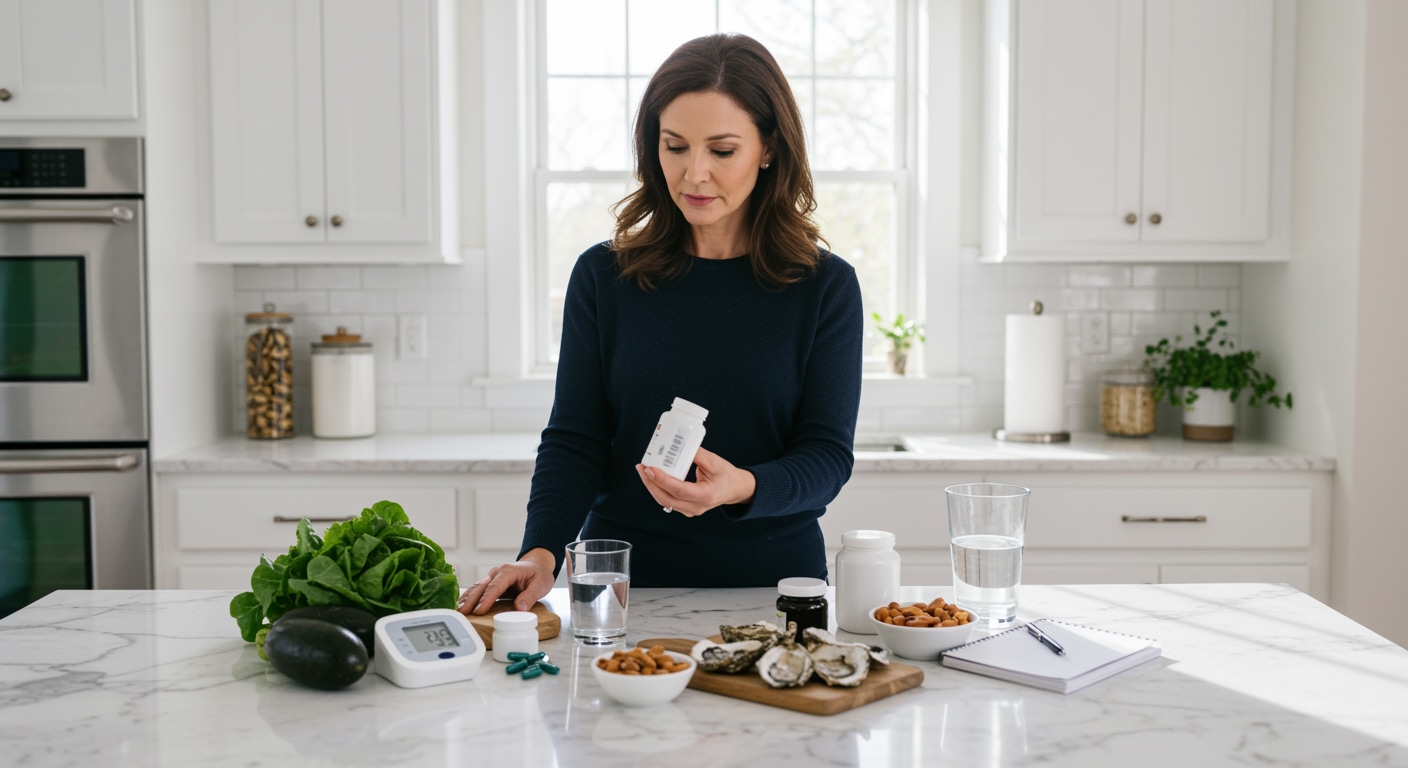✪ Key Takeaway: Hypotension patients should avoid zinc supplements as they can further lower blood pressure and worsen symptoms.
Introduction
Your blood pressure drops to 90/60 mmHg and you feel dizzy every time you stand up.
You might be wondering if zinc supplements could help boost your energy and overall health while managing hypotension.
Hi, I’m Abdur, your nutrition coach and today I’m going to explain whether zinc supplements are safe for people with low blood pressure and what you need to know before taking them.
How Does Zinc Affect Blood Pressure?
Zinc plays a crucial role in your cardiovascular system by affecting blood vessel function and fluid balance.
Research shows that zinc supplementation can lower blood pressure in people with normal or high blood pressure levels.
The mineral works by improving endothelial function, which is the inner lining of your blood vessels that helps regulate blood flow.
When zinc enhances endothelial function, your blood vessels become more flexible and can dilate more easily.
This increased flexibility allows blood to flow more freely, which naturally reduces pressure against your artery walls.
For someone with hypotension, this blood pressure lowering effect could push your already low readings even lower.
✪ Fact: Studies show zinc supplementation can reduce systolic blood pressure by 2-3 mmHg in healthy adults.
What Are The Risks For Hypotension Patients?
Taking zinc supplements when you already have low blood pressure can worsen your symptoms significantly.
You might experience more frequent episodes of dizziness, especially when standing up quickly from a sitting or lying position.
This condition, called orthostatic hypotension, becomes more pronounced when your blood pressure drops further due to zinc supplementation.
Fatigue and weakness could also increase because your organs receive less oxygen-rich blood when pressure is too low.
Some people with hypotension who take zinc supplements report feeling more lightheaded throughout the day.
In severe cases, extremely low blood pressure can lead to fainting episodes or falls that could result in injury.
Your heart might also work harder to pump blood effectively when pressure drops too low, potentially causing palpitations or irregular heartbeats.
✪ Note: Blood pressure below 90/60 mmHg is considered hypotension and requires careful supplement management.
Should You Get Zinc From Food Instead?
Getting zinc from whole foods is generally safer for hypotension patients than taking concentrated supplements.
Food sources provide zinc in smaller, more manageable amounts that are less likely to cause dramatic blood pressure changes.
Excellent zinc sources include oysters, beef, pumpkin seeds, chickpeas, and cashews that provide steady nutrient absorption.
Your body can better regulate zinc absorption from food compared to the concentrated doses found in supplements.
Food sources also come with other beneficial nutrients that work together to support your overall health without isolated effects.
A balanced diet with zinc-rich foods typically provides adequate amounts for most people without the risks associated with supplementation.
If you suspect zinc deficiency, work with your healthcare provider to test your levels before making any dietary changes.
✪ Pro Tip: Three ounces of cooked oysters provide about 74mg of zinc, which exceeds daily requirements safely.
When Might Zinc Supplementation Be Necessary?
Some hypotension patients might need zinc supplements despite the blood pressure concerns, but only under medical supervision.
Severe zinc deficiency can cause immune system problems, slow wound healing, and hair loss that outweigh blood pressure risks.
People with digestive disorders like Crohn’s disease or celiac disease might have trouble absorbing zinc from food alone.
Vegetarians and vegans sometimes need supplements because plant-based zinc sources are less easily absorbed than animal sources.
Your doctor might recommend lower doses taken with food to minimize blood pressure effects while addressing deficiency.
Regular blood pressure monitoring becomes essential if you must take zinc supplements for medical reasons.
Some healthcare providers suggest taking zinc supplements at bedtime when blood pressure naturally fluctuates less dramatically.
✪ Note: Blood tests can determine zinc deficiency more accurately than guessing based on symptoms alone.
What Are Better Alternatives For Hypotension?
Instead of zinc supplements, focus on lifestyle strategies that can help raise your blood pressure naturally and safely.
Increasing your salt intake moderately can help retain fluid and boost blood pressure when done under medical guidance.
Drinking more water throughout the day helps maintain blood volume and prevents dehydration-related pressure drops.
Wearing compression stockings can improve blood flow from your legs back to your heart, reducing dizziness symptoms.
Small, frequent meals prevent postprandial hypotension, which is blood pressure drops after eating large meals.
Regular exercise, especially activities that strengthen your leg muscles, can improve circulation and blood pressure regulation.
If you need immune support that zinc typically provides, consider vitamin C or elderberry supplements that do not affect blood pressure.
✪ Pro Tip: Standing up slowly and flexing your calf muscles can prevent sudden blood pressure drops naturally.
The Bottom Line
Hypotension patients should avoid zinc supplements because they can lower blood pressure further and worsen symptoms like dizziness and fatigue.
When managing low blood pressure, every supplement choice matters more than convenience.
I would love to hear about your experience with hypotension management or any questions you have about supplements and blood pressure in the comments below.
References
At NutritionCrown, we use quality and credible sources to ensure our content is accurate and trustworthy. Below are the sources referenced in creating this article:
- PubMed: Effects of zinc supplementation on blood pressure: a meta-analysis
- Mayo Clinic: Zinc supplements: Uses, side effects, and more
- Office of Dietary Supplements: Zinc – Health Professional Fact Sheet
- Nebraska Medicine: Are zinc supplements safe? What you need to know





